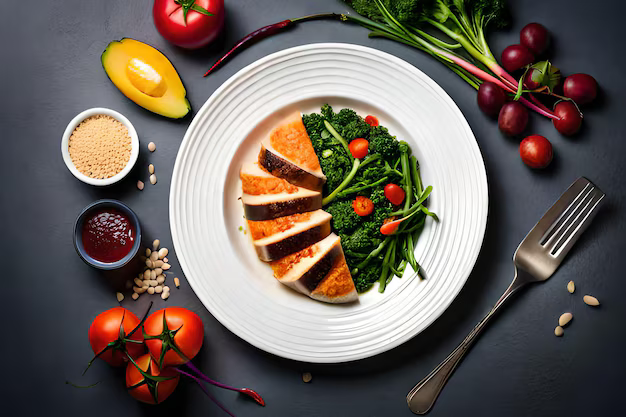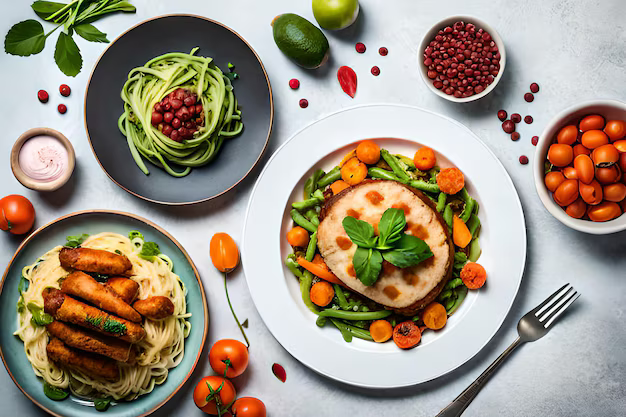We’ve all been there — dinner is over, but your stomach (or is it your mind?) is calling you back to the kitchen. You’re not alone! Many of us experience the temptation of after-dinner cravings, which can feel frustrating, especially when you’re trying to stay on track with your health goals.
So, why does this happen, even if you’ve eaten well during the day? Let’s break it down and explore practical solutions to help you manage those late-night snack urges.
Why Do After-Dinner Cravings Happen?

After-dinner cravings can stem from different triggers, both emotional and physical. Sometimes, stress, boredom, or simply a habit can make you crave something sweet or salty, even when you’re not hungry. On the other hand, if your meals throughout the day haven’t been balanced, your body might be sending you signals for more nutrients.
For example, if you’re not eating enough protein or calories during the day, your body may crave extra food to meet its needs. Including protein in every meal can help regulate your appetite and reduce these cravings later on. By understanding what’s driving your cravings, you can address them more effectively.
The Science Behind Satiety: Protein and Veggies to the Rescue

When it comes to feeling full after a meal, protein and vegetables are your best friends. Protein has a high satiety index, meaning it helps you feel fuller for longer by triggering appetite-regulating hormones like cholecystokinin (CCK) and glucagon-like peptide-1 (GLP-1). By adding a good source of protein to each meal, you’ll naturally reduce the likelihood of those evening snack urges.
Vegetables also play a crucial role in curbing cravings. They’re high in fiber, which slows digestion and keeps you feeling full for a longer time. Plus, they’re packed with water, which adds volume to your meal without adding extra calories. So, the next time you’re preparing a meal, load up on veggies to help satisfy your hunger and curb cravings later in the day.
Meal Sizing: Finding the Right Balance

The size and balance of your meals directly impact your chances of dealing with after-dinner cravings. If you skip calories throughout the day or don’t eat enough at dinner, your body will likely look for a midnight snack to make up for the missing nutrients.
However, overeating isn’t the answer either. It can lead to uncomfortable fullness, disrupt your metabolism, and even affect your sleep. The key is to find a balanced meal size that combines protein, healthy fats, and complex carbs. This combination provides steady energy throughout the night, making it easier to avoid cravings.
Take a Walk After Dinner: A Simple Way to Curb Cravings

After you finish your dinner, consider taking a light walk. It’s an easy yet powerful way to distract yourself from those late-night cravings while offering several physical and psychological benefits.
Physically, walking helps with digestion by stimulating your muscles and promoting food movement through your digestive tract. It also helps regulate blood sugar levels, which can reduce the dips that trigger cravings. Psychologically, walking is a great way to shift your focus from food, improve your mood with endorphin release, and just give your mind a break.
If you want to make it even easier, consider using a treadmill for your post-dinner walk. No matter the time of year or weather outside, a treadmill can provide you with a convenient and effective way to stay on track.
Conclusion: Seize the Night, Master Your Cravings
Conquering after-dinner cravings is not just about willpower; it’s about understanding your body’s needs and responding in a way that supports your health goals. By tuning into your body’s signals, prioritizing protein and veggies, finding a balanced meal size, and embracing movement, you’re not just dodging cravings — you’re building habits that support long-term health and wellness.
Start tonight, and take that first step toward mastering your cravings with confidence!
FAQs About After-Dinner Cravings
Q: How can I stop late-night cravings?
A: Try having a balanced meal with enough protein and fiber throughout the day to keep your cravings in check. A post-dinner walk can also help distract you.
Q: Why do I get cravings after dinner even if I’m not hungry?
A: Emotional triggers, like stress or boredom, can often masquerade as hunger. It’s essential to recognize these feelings and avoid eating out of habit.
Q: How can protein help reduce after-dinner cravings?
A: Protein helps regulate appetite hormones and provides a longer-lasting feeling of fullness, preventing late-night snacking.
Q: Is a post-dinner walk effective in curbing cravings?
A: Yes! Walking helps with digestion, stabilizes blood sugar levels, and shifts your focus away from food, all of which can help reduce cravings.

